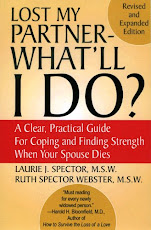In
Parts 2 and
3 of these excerpts from
Lost My Partner, we looked at various ways anger about your loss may be misdirected, either towards yourself or others.
While it’s important to be aware that you’re feeling anger, it’s equally important to look at what you’re doing with it.
Feeling an emotion and
expressing it are two very different things. Everyone feels anger sometimes, but the way you choose to deal with that anger can make a world of difference. You’ll probably feel angry and abandoned by your partner when it comes time to deal with financial headaches, your children, family conflicts, etc. Misdirecting your anger in any way, such as yelling at your family for no reason, won’t really make you feel better or less angry.
Here are some examples of choices you can make in handling anger:
DESTRUCTIVE WAYS:
- Verbally or physically attacking others.
- Turning anger inward. For example, scolding yourself, injuring your body by hitting something too hard, or having “accidents”.
- Doing self-destructive things like excessive drinking or drug use, driving recklessly, or neglecting your health.
CONSTRUCTIVE WAYS:
- Talking about your angry feelings to someone who will understand, such as close friends, grief counselors, widowed groups or religious advisors.
- Writing a letter to whomever you’re angry with but not mailing it, then taking a brisk walk around the block.
- Punching a pillow or a cushioned piece of furniture.
- Sitting in a room at home with the widows closed (so the neighbors aren’t alarmed), and shouting.
If you’ve come up with any other constructive strategies for venting anger, please share them with us.









